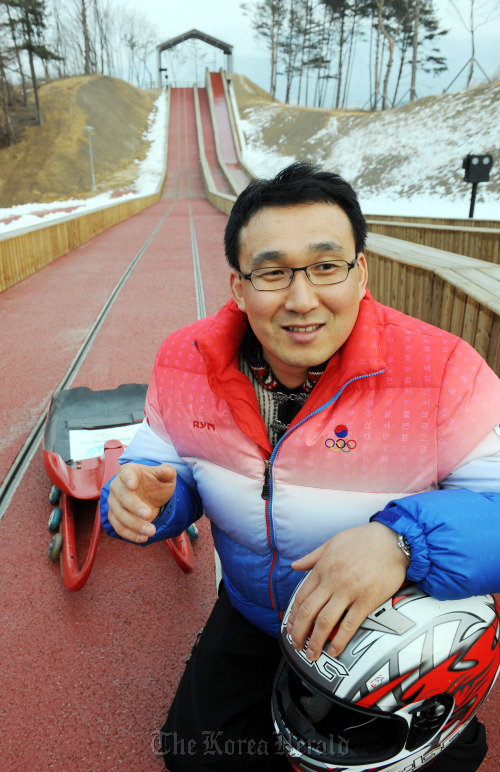Kang Kwang-bae focused on bringing 2018 Winter Olympics to PyeongChang
PYEONGCHANG, Gangwon Province ― There’s no better word than “challenge” to describe his career. Kang Kwang-bae, 37, is a pioneer in winter sports in Korea. He was the first Korean athlete to take on sled events at the Winter Olympics.
He made his Olympic debut by competing in the luge at the 1998 Winter Games. Then, after switching to skeleton, he competed at the 2002 and 2006 Olympics.
And last year in Vancouver, he led the Korean bobsleigh team, becoming the first athlete to compete in all three sled events at the Olympics.
Of course, it hasn’t been an easy road for him to accomplish such a feat.
“Every time it was a great challenge,” Kang recalls, sitting in a meeting room at the Alpensia Resort in PyeongChang.
Kang, in fact, never expected to be a luge athlete until he ended his career as a professional skier following a knee injury.
“I was in my early 20s, and I was so devastated that I would no longer be able to wear my ski boots,” he says while rubbing his hands over his left knee.
His disappointment, however, didn’t last long. He had found out that the Korean Olympic Council was looking for an athlete to become the country’s first luger.
“I had no idea about the sport, but I just went for it, because competing at the Olympics was my dream.
 |
Winter sports pioneer Kang Kwang-bae (Park Hyun-koo/The Korea Herald) |
“I was delighted that I didn’t have to worry about my knees for doing luge. And when I first took to the ice, I felt comfortable, and felt like this is the place I want to be at,” says the tall, broad-shouldered athlete with a big smile on his face.
He also knew that it was going to be a hard challenge. Back then the sport was hardly known here, and there was no training facility whatsoever.
So after his first Olympics, he decided to move to Austria for better training. And there, he had his first experience of the skeleton.
But it was not his choice to switch from luger to a skeleton racer. “I was dismissed from the national luge team while I was in Austria.”
He explains further, “But I wanted to be at the Olympics again, and so I decided to become a skeleton racer.”
But since there was not a single skeleton player here, hence no local governing body for the sport, he had to set up his own team and even the skeleton federation to compete at the Olympics.
“It was hard to do everything by myself, but not enough to stop my Olympic dream,” he says, tapping on his chest.
His ambition did not stop there. Four years later in Vancouver, he challenged himself to take a 4-man bobsleigh ride, leading the first ever Korean bobsleigh team.
He compares the experience to a scene from the movie “Cool Runnings,” based on the story of the Jamaican bobsleigh team’s debut at the 1988 Winter Olympics.
“We were like the bobsleigh movie. We did well in the first and second round, but failed to pull off in the end,” he says.
On their Olympic debut, the Korean bobsleigh team managed to go through to the final round, only to finish 19th among 20 entries.
Was he disappointed with the result? “Of course not, I was just happy to keep competing at the competition.”
With the recognition of his contribution to the winter sport, Kang was elected last year as a vice president of International Bobsleigh and Skeleton Federation.
“Now I have full responsibility for spreading the sport not only here but also around the world,” he says.
Only a few, including just two countries from Asia, Korea and Japan, compete in the world sled events at the moment, according to Kang.
“Even China hasn’t got a bobsleigh team. If you think about its population this is nonsense,” he says with a sigh.
But he claims that this could change if PyeongChang is chosen to host the 2018 Winter Games.
Currently, Japan is the only country which has its own bobsleigh venue in the entire Asia region. PyeongChang has pledged to add another one, but on the condition of whether it wins the bid to host the Winter Olympics.
“We desperately need to have another sled venue. It will certainly boost the population of the sport.”
Kang has been directing PyeongChang’s plan after being appointed as a sport director of the bid committee last year. He is now taking some time off from the ice in order to focus on delivering his knowledge and experience to PyeongChang’s bid campaign.
And this Wednesday is a big day for him. Kang is scheduled to deliver a presentation to the IOC evaluation commission, explaining PyeongChang’s Winter Games plan and proposed sports venues.
“It’s another challenge for me as I have to do it in English,” says Kang.
“But I’m ready to pull it off, I’m prepared.”
Asked about PyeongChang’s chance to win the bid, he takes his time before saying, “I think it is like competing in the Olympics. You can’t expect to win until you finish the game.”
“All we have to do is to be prepared and keep focusing until the final day, like Olympic athletes do.”
By Oh Kyu-wook (
596story@heraldcorp.com)





![[Exclusive] Hyundai Mobis eyes closer ties with BYD](http://res.heraldm.com/phpwas/restmb_idxmake.php?idx=644&simg=/content/image/2024/11/25/20241125050044_0.jpg)
![[Herald Review] 'Gangnam B-Side' combines social realism with masterful suspense, performance](http://res.heraldm.com/phpwas/restmb_idxmake.php?idx=644&simg=/content/image/2024/11/25/20241125050072_0.jpg)

